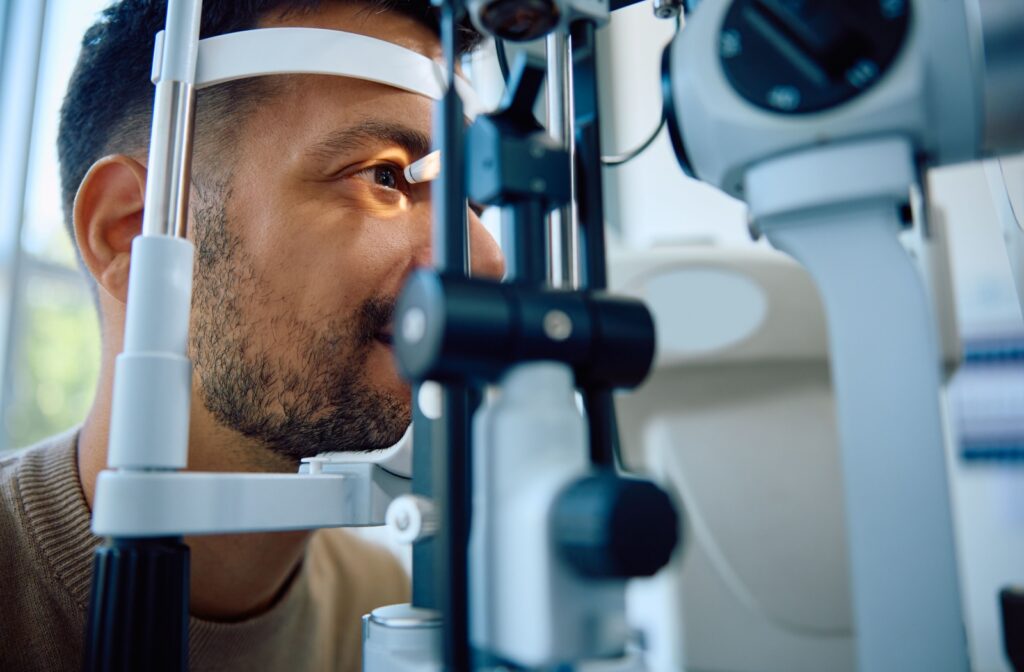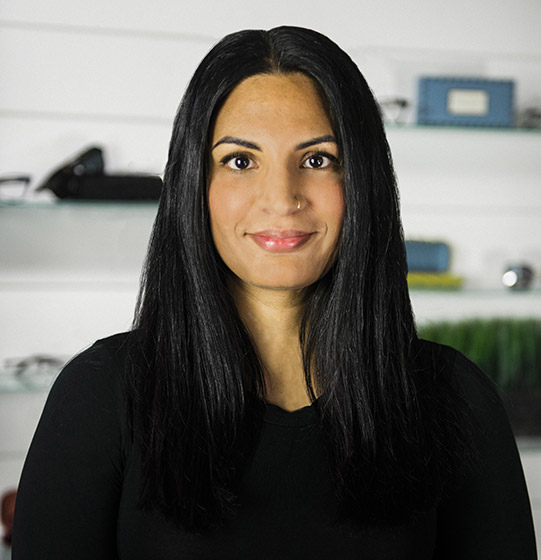Do you remember the last time you had a comprehensive eye exam? If not, it might be time to book one. Regular exams do more than just check your vision—they give your optometrist a clear picture of your overall eye health and can help catch early signs of conditions like glaucoma or diabetic retinopathy before they become serious.
Kids should have an eye exam every year to support their learning and development. For most adults, every two years is a good rule of thumb. But if you wear contacts, have a health condition like diabetes, or notice changes in your vision, you may need to come in sooner.
How Often Do You Need to Book an Eye Exam?
The recommended frequency of eye exams depends on your age, lifestyle, and overall eye health. If you’re concerned about the cost, don’t worry, there may be insurance options or public health coverage that can help keep your care affordable.
Here’s a general guideline for how often you or your child should get an eye exam:
Infants & Toddlers
Birth to 6 months: A comprehensive eye exam helps detect early abnormalities.
6 months to 3 years: An eye exam during this stage helps assess eye alignment, focusing ability, and overall development.
Preschoolers
Ages 3–5: The Canadian Association of Optometrists recommends at least one eye exam between ages 3 and 5. These early exams can help identify vision issues like nearsightedness, farsightedness, astigmatism, and other potential concerns.
Kids & Teens
Ages 5–19: Annual eye exams help monitor vision changes and support healthy development, especially important during school years when clear vision supports learning and academic performance.
Adults
Ages 19–65: For healthy adults with no significant vision issues, an eye exam every two years is the norm. However, more frequent visits may be needed if you:
- Wear glasses or contact lenses
- Have a family history of eye disease
- Work in visually demanding environments
- Have underlying health conditions like diabetes or high blood pressure
Seniors
Ages 65 and older: Age increases the risk of developing eye diseases such as glaucoma, AMD, and cataracts. We recommend annual eye exams in general, though some people may require more frequent visits depending on their needs.
Why Are Comprehensive Eye Exams So Important?
A full eye exam is more than just reading letters on a chart. It’s a complete health check-up for your eyes, and often, your overall well-being. Your exam may include:
- Visual acuity test: Measures how well you see at various distances.
- Refraction test: Determines your prescription for glasses or contacts.
- Eye muscle test: Assesses how well your eyes work together.
- Pupil response test: Checks how your pupils respond to light.
- Colour vision test: Screens for colour blindness or deficiencies.
- Eye pressure test (tonometry): Screens for glaucoma.
- Slit-lamp exam: Uses magnification to examine eye structures in detail.

Your Eyes Tell a Bigger Story Than You Think
Did you know that your eyes can reveal early signs of systemic conditions like diabetes, high blood pressure, and even certain types of cancer? That’s one of the many reasons regular eye exams are a vital part of your overall health routine.
Here are a few common eye conditions that exams can help detect and manage:
Presbyopia
As we age, the lens in our eyes becomes less flexible, making it harder to focus on close-up objects. This condition is called presbyopia, and it can make everyday tasks like reading or using a computer more difficult. While it’s not vision-threatening, it can significantly affect quality of life.
Cataracts
Cataracts develop when the eye’s natural lens becomes cloudy, leading to blurred or dulled vision. They typically progress over time and may require surgery if they interfere with your daily activities.
Diabetic Retinopathy
High blood sugar levels can damage the blood vessels in the retina, causing diabetic retinopathy. Left untreated, this condition can lead to vision loss or blindness.
Age-Related Macular Degeneration (AMD)
AMD affects the macula, the part of the retina responsible for sharp central vision. It can cause symptoms like blurry vision and difficulty recognizing faces. While there’s no cure, early management can help slow progression.
Glaucoma
Often called the “silent thief of sight,” glaucoma causes gradual damage to the optic nerve. Because it usually develops without symptoms, regular eye exams are essential to detect and manage it early before vision loss occurs.
Does Your Vision Prescription Still Work for You?
The validity of your prescription depends on your age and visual needs. As a general guideline:
- Children: Prescriptions are usually valid for 6–12 months.
- Adults: Prescriptions are typically valid for 1–2 years.
However, we may recommend more frequent check-ins based on your eye health. Always consult with your optometrist to understand what’s aligned with your needs.
Keeping Your Eyes Healthy Starts with a Simple Step
No matter your age or vision needs, regular eye exams are a key part of maintaining your health and quality of life. They help catch changes early, protect against long-term damage, and give you peace of mind that your eyes are working as they should. If it’s been a while since your last visit, or if you’re unsure when to book next, we’re here to help. At Visionary Eye Centre, we make preventative care accessible and approachable. Book your next eye exam today and let our friendly team help you see the world more clearly and comfortably.



